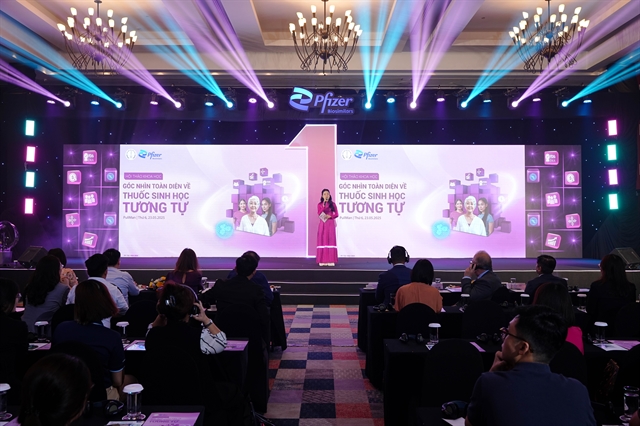 Society
Society


|
| A view of the symposium, entitled 'A Comprehensive Perspective on Biosimilars', in Hà Nội. — Photo courtesy of the organiser |
HÀ NỘI — Health experts discussed advanced biologic therapies in breast cancer treatment at a symposium in Hà Nội on May 24.
The event, entitled 'A Comprehensive Perspective on Biosimilars' was jointly organised by the Vietnam Cancer Association, the Vietnam Cancer Immunotherapy Association and Pfizer Vietnam.
The event offered opportunities for professional development, knowledge exchange and practical insights between international experts and Vietnamese healthcare professionals in terms of both current and future contexts of breast cancer treatment with biologic therapies. The initiative also contributed to enhancing budget sustainability and ensuring the quality of breast cancer care in Việt Nam.
The discussed topics at the conference included the role of biologic therapies in breast cancer treatment, the outlook for biosimilars in Việt Nam and the global development and strategic application of biosimilars. These discussions have reflected the increasingly vital role of biosimilars in global healthcare systems in recent years.
Like many other countries, Việt Nam continues to see a rise in cancer incidence. According to GLOBOCAN 2022, Việt Nam recorded 180,480 new cancer cases and 120,184 cancer-related deaths. Breast cancer is the most prevalent form of cancer among women in the country, with 24,563 new cases, accounting for 28.9 per cent of female cancers and over 10,000 deaths, representing 8.3 per cent of all cancer-related deaths in Việt Nam. The World Health Organization (WHO) estimates that the global number of breast cancer diagnoses could reach 3.1 million by 2040.
HER2-positive breast cancer is known to be more aggressive than other subtypes. Many reports have shown that HER2-positive breast cancer accounts for approximately 20 per cent of all breast cancer cases.
Despite progress in treatment choices, breast cancer patients still face challenges, such as drug resistance to anti-HER2 drugs, leading to reduced treatment efficacy and high costs. Therefore, early diagnoses and access to biologic therapies are critical factors that not only improve treatment outcomes but also help reduce the overall cost of care for patients.
“For a biosimilar to be truly valuable, it must fulfill two conditions: firstly, it must offer equivalent therapeutic outcomes to the originator product; and secondly, it must help reduce healthcare costs, creating economic value for payers and healthcare systems,” said Dr Paul Cornes, Consultant Oncologist at the Comparative Outcomes Group.
“Now, the challenge is to optimise their economic value by biosimilar and sharing best practices and collecting real‑world data, so that countries like Việt Nam can identify and apply the most effective solutions,” he said.
“The introduction of biosimilars has played a critical role in easing the financial burden on patients, expanding access to essential therapies and enabling them to extend their lives. Leading global pharmaceutical companies continue to develop new biosimilars to enhance treatment outcomes, and in Vietnam, the demand for biosimilars is growing rapidly,” said Associate Professor Nguyễn Tuấn Dũng, the University of Medicine and Pharmacy in HCM City.
“With today’s rapid medical advancements, innovative treatments are opening new opportunities for cancer patients in general, and breast cancer patients specifically. Besides, the availability of biosimilars not only expands access to modern and efficient therapies that can extend and improve lives but also provides a more affordable treatment option,” said General Director of Pfizer Vietnam, Darrell Oh. — VNS